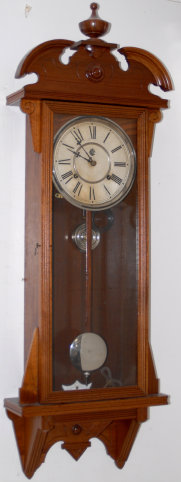
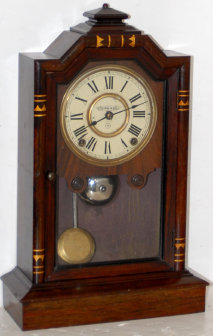
113. $750
Seth Thomas Clock Co. “Atlas”, ca 1881. This clock is a mate
to the Seth Thomas Hecla. Cases are slightly different but the internal parts are the same. The Atlas has a triple winding movement
that strikes a Cathedral Bell on the hours and two cup bells on the quarter hours. The wall clock “Marcy” and the Hecla are the only
other clock ST made that used this movement. The 22 ½” high walnut case has been cleaned/polished at some point and is user ready.
There are ¾ columns on the front and ¼ columns on the back edges. The door has a key lock on the side, and it has the excellent original
glass in the door. Stamped on the back is the factory “completion date” of 5881A, or January 1885. Inside on the base is a good black
label. The clock has nickeled accessories including dial rings, Cathedral gong base, and damascened pendulum bob and hanger. The original
dial is very nice for its age. The movement as previously stated is unusual and very rare, clean and operating properly. A very special
clock. Ly-Seth Thomas, page 718. $1000-$1500.
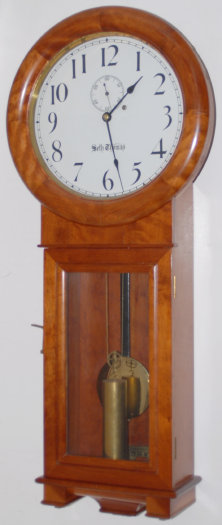
114. $400
Seth Thomas Clock Co. “Regulator No. 2”, ca 1976. A reproduction
clock signed inside on the case bottom by the maker, dated 1975. It looks like it just came from the factory. The cherry case is 36”
high, and perfect. The case is made of cherry, hand finished, and identical to early Regulator No. 2’s. Painted metal dial is 12”,
it is signed, and has three correct hands. The accessories including the brass weight, brass bob and wood stick, brass pulley, brass
beat scale, and are all correct. The 8-day Seth Thomas type brass movement is signed, “American Clock / Made in USA”, and is running.
The reissue clocks are pictured in Ly-Seth Thomas, page 278. $500-$750.
112. $150
Seth Thomas Clock Co. early City Series clock, “Atlanta”, ca
1875. There is a lot of hardware inside this 19.5” high rosewood veneered case. Behind the original dial is a large lyre 8-day movement
that is signed and still has the Geneva stops. In is running and striking the hours on a bright nickeled bell. The special pendulum
bob is brass with the “ST” button in the center and the hanger is silver colored. Inside, on the base, is a good portion of the original
black label but very dark. The dial is original and in good condition. This model and the Omaha, have some gold stripe decorations
around the case edge. The gold is still holding. The case has an edge nick or two, otherwise is in very good condition. A good
starting clock for City Series collectors. Ly-Seth Thomas #508. $200-$300.
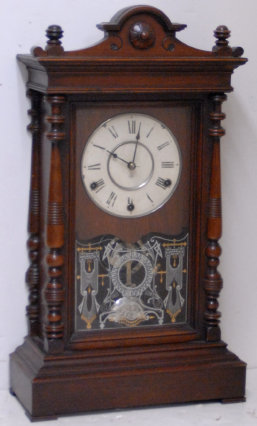
111. $300
Waterbury Clock Co. hanging “Carleton”, ca 1893.The walnut case
is 43 inches high, retains the original finish but is very clean and polished, and retains all its numerous attachments and ornaments.
There is a black label on the inside bottom but is so dark I cannot read it. Also inside is a porcelain beat scale, silver pendulum
bob, wood stick, silver gong base, silver dial rings, and original signed dial. The 8-day movement is running and strikes half hours
and hours on a Cathedral gong. There is a piece of paper label on the back and a latch holding the door. The door glass is probably
a replacement but otherwise the clock is excellent. Ly-Waterbury #610. $400-$600.


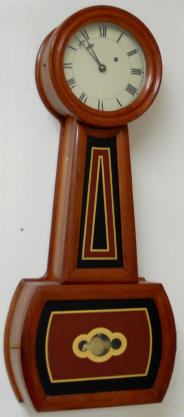
109. $500
E. Howard & Co. Boston, reproduction of their “No. 5 Banjo”,
ca 1981. It was not made by Howard but by a Tennessee artisan. The cherry case is 29” high, all three glasses are original, the case
is clean and polished, has good graining, no repairs or new wood parts, and has the two original door latches. The new iron dial was
professionally painted; pendulum, iron weight, weight baffle, pulley, and 8-day movement are all original to the case and the style
Howard used in their banjos. The dial has the original paint that is still in excellent condition, the movement is signed “Cline”,
and the weight is the style used in this type banjo. The movement was purchased from Wayne Cline, Bowling Green, Kentucky, hence his
name on the movement. He was a renowned maker of banjo clocks. There is no pendulum tie down; otherwise this
is a good straight reproduction No. 5 in very nice overall condition. Ly-American Clocks, Volume 1, page 117 pictures the Howard No.
5. $750-$1000.
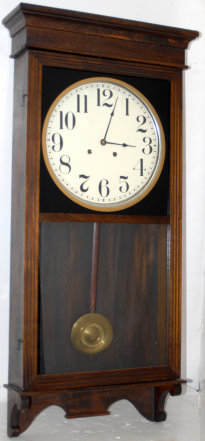
110. $150
Sessions Clock Co. “Regulator No. 4”, ca 1912. These clocks are
more commonly called shop clocks or store regulators for that is usually where they hung in the early days. Only in the last 30-40
years have collectors began to appreciate their design and functionality in home decorations. Nowadays you see at least one in every
collector’s kitchen or den and in many restaurants. This wooden clock has a mahogany finish, stands 38 ½” high, and has a time and
strike 8-day movement in it. The brass bob, wood stick, painted glass, dial and hands are all original to this case. The paper dial
is very clean so no doubt a replacement. The pendulum bob is a more elaborate one than usually came with these clocks. On the back
is most of a paper label. There are two door hooks to hold the large door in place and a winding key is included. Ly-Sessions #127.
$200-$400.